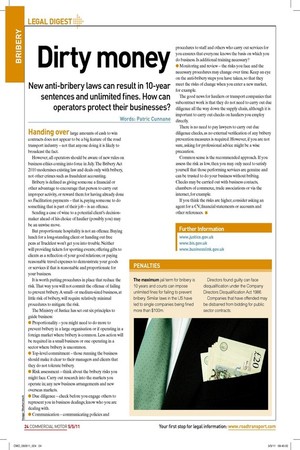Dirty money
Page 21

If you've noticed an error in this article please click here to report it so we can fix it.
New anti-bribery laws can result in 10-year sentences and unlimited fines. How can operators protect their businesses?
Words: Patric Cunnane Handing over large amounts of cash to win contracts does not appear to be a big feature of the road transport industry – not that anyone doing it is likely to broadcast the fact.
However, all operators should be aware of new rules on business ethics coming into force in July. The Bribery Act 2010 modernises existing law and deals only with bribery, not other crimes such as fraudulent accounting.
Bribery is deined as giving someone a inancial or other advantage to encourage that person to carry out improper activity, or reward them for having already done so. Facilitation payments – that is, paying someone to do something that is part of their job – is an offence.
Sending a case of wine to a potential client’s decisionmaker ahead of his choice of haulier (possibly you) may be an unwise move.
But proportionate hospitality is not an offence. Buying lunch for a long-standing client or handing out free pens at Truckfest won’t get you into trouble. Neither will providing tickets for sporting events; offering gifts to clients as a relection of your good relations; or paying reasonable travel expenses to demonstrate your goods or services if that is reasonable and proportionate for your business.
It is worth putting procedures in place that reduce the risk. That way you will not commit the offence of failing to prevent bribery. A smallor medium-sized business, at little risk of bribery, will require relatively minimal procedures to mitigate the risk.
The Ministry of Justice has set out six principles to guide business: ● Proportionality – you might need to do more to prevent bribery in a large organisation or if operating in a foreign market where bribery is common. Less action will be required in a small business or one operating in a sector where bribery is uncommon.
● Top-level commitment – those running the business should make it clear to their managers and clients that they do not tolerate bribery.
● Risk assessment – think about the bribery risks you might face. Carry out research into the markets you operate in; any new business arrangements and new overseas markets.
● Due diligence – check before you engage others to represent you in business dealings; know who you are dealing with.
● Communication – communicating policies and procedures to staff and others who carry out services for you ensures that everyone knows the basis on which you do business. Is additional training necessary?
● Monitoring and review – the risks you face and the necessary procedures may change over time. Keep an eye on the anti-bribery steps you have taken, so that they meet the risks of change when you enter a new market, for example.
The good news for hauliers or transport companies that subcontract work is that they do not need to carry out due diligence all the way down the supply chain, although it is important to carry out checks on hauliers you employ directly.
There is no need to pay lawyers to carry out due diligence checks, as no external veriication of any bribery prevention measures is required. However, if you are not sure, asking for professional advice might be a wise precaution.
Common sense is the recommended approach. If you assess the risk as low, then you may only need to satisfy yourself that those performing services are genuine and can be trusted to do your business without bribing. Checks may be carried out with business contacts, chambers of commerce, trade associations or via the internet, for example.
If you think the risks are higher, consider asking an agent for a CV, inancial statements or accounts and other references. ■
















































